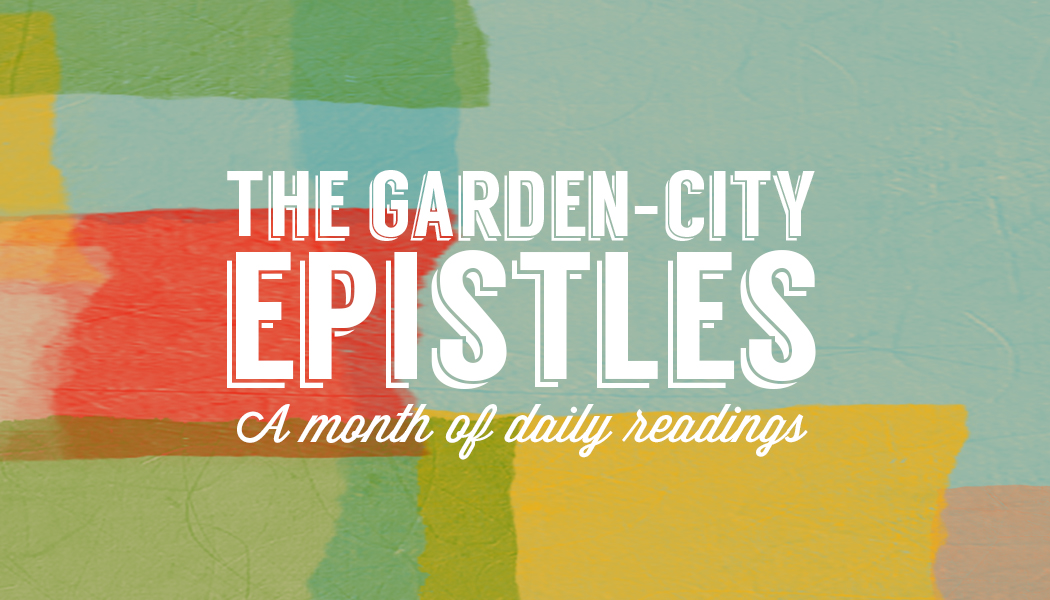I wrote this letter for Nathan and Christy Randall, who are equal parts Google and granola.
One of my favorite writers is Wendell Berry. He’s a poet and a conservationist, an old school farmer with a love for the earth. Berry often speaks of his need to work with the land: “The care of the Earth is our most ancient and most worthy, and after all our most pleasing responsibility. To cherish what remains of it and to foster its renewal is our only hope.” He is careful to listen and to observe what the land is saying, and to interfere as little as possible with the natural order.
I picture Wendell Berry curling his lip at the thought of a book about cities. Never a fan of density or frivolity, Berry would likely prepare one of his venomous diatribes, heaping scorn upon the very suggestion of cities as the intention of God.
Part of you probably feels like Wendell Berry does. The difference, however, is that you’re willing to hear me out. You’ve given me a chance to make my argument and you’ve bided your time while I carefully set the board, getting all my pieces in place.
But the big question you’re probably asking, the one that you can’t hold in any longer, is this: Do we have to live in cities to be good? If God gave us a garden, but requires a city, does that mean we have to move downtown to be holy?
Of course not.
The city is a metaphor for cooperative work with God. I’ll develop that more fully later on, but for now let it suffice to say that urbanity is not the point—cooperation is.
A city is no more inherently spiritual than a rural community or an out-of-the-way farm. The opposite of a godly city is not a godless farm, but a godless city. Agriculture is, in the strictest sense, part of city-life since the city depends on what it obtains from elsewhere.
This, I think, is what would frustrate Wendell Berry. He thinks of cities as parasites that only consume, only waste, and never produce. Similarly, theologian Jim Perkinson points out, “A city represents a masked structure of dependence on various ‘elsewheres.’ No city is able to grow its own necessary foodstuffs and fabrics inside of its own borders or mine its needed metals and minerals from under its own feet…a city, in this sense, is a large mouth, consuming en ever-growing torrent of resources and energies forcibly harvested from their point of natural origin.”[1]
Berry and Perkinson have a point, but they’re still wrong. Cities are places of tremendous beauty and ingenuity, treating civilization to the application of skill and labor in architecture, economics, the arts, and culture. And the relationship of the city to the land, though more complex, is still much like that of the farm. Ecologists work in cities, and any protection the land receives comes from the centers of the population and not from the hillbillies still living in the moss.
The city is a metaphor, but our cities are also pretty good examples for how we have to work together in order to survive. I know you like the country—believe it or not, so do I—but the country, like the garden, is just a way of talking about the things God gave us. The land is the starting point. It was the original gift. But that gift came with instructions: fill the earth and subdue it.[2] There’s some assembly required.
At the end, God will want to know what we did with the gift. Did we watch it? Or did we work it?[3]
[1]Jim Perkinson, “Theology and the City: Learning to Cry, Struggling to See” Cross Currents, vol. 51., no. 1 (Spring 2001), accessed December 17, 2008, http://www.crosscurrents.org.
[2] Genesis 1.28.
[3] Matthew 25.14-30.
fossores
Related posts
Categories
Category Cloud
Tag Cloud
Recent Posts
- Victors and Victims November 6, 2018
- 3 Hacks for Happiness October 29, 2018
- Hope Against Death September 20, 2018
- The Shape Of The Cross September 19, 2018


